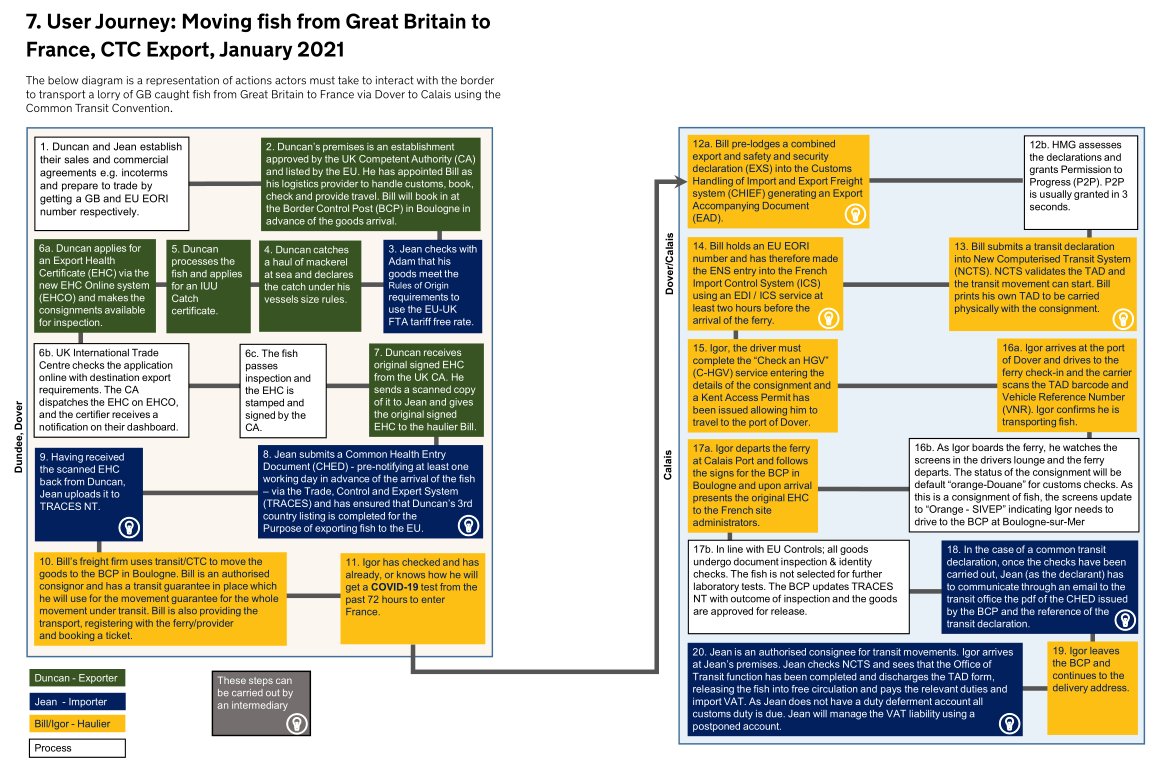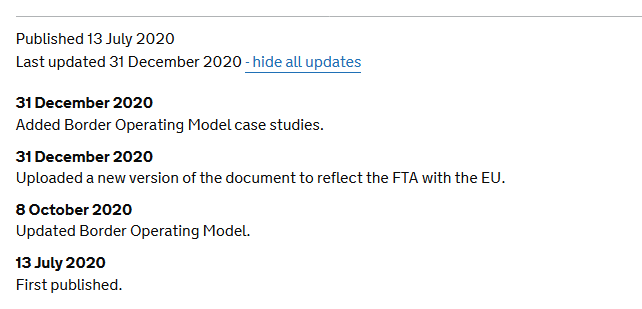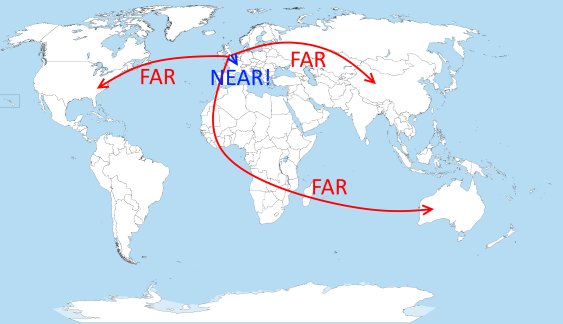Or, arguably, before the Brexit referendum. Just the 70 pages of case studies released TODAY could have tipped the result the other way. Not everyone is blinded by sovrinty & hating forrins.
UK Government just released 70 pages of case studies today, showing how the borders will operate after 1 January 2021.
They're essentially hardcore porn for red tape fetishists.
Doomed, we are. Doomed.
(e.g. exporting fish; exporting mechanical goods)
https://t.co/zWpkdGJeim

Or, arguably, before the Brexit referendum. Just the 70 pages of case studies released TODAY could have tipped the result the other way. Not everyone is blinded by sovrinty & hating forrins.
The person in France buying (say) UK mechanical goods will take one look at the procedures involved, and Google an alternative supplier inside the EU instead.
The purchasers will smell them coming a mile away.
The 70 pages of case studies were only published TODAY, 31 December 2020. (As was the revised version of the main document, reflecting the Brexit deal.) This is brand new stuff, never seen by businesses.

https://t.co/lAGSlD1i0l
Here's how the UK's situation will change after the transition period ends, compared to our former EU membership...
— Edwin Hayward \U0001f984 \U0001f5e1 (@uk_domain_names) December 31, 2020
(Come back to this thread. It will keep growing!)
- UK can negotiate its own trade deals
- No more automatic participation in new trade deals reached by the EU
It combines a bucket of facts (700 references) with the kind of gallows humour you've seen in my tweets, and debunks two dozen Brexit myths.
Paperback looks pretty on a coffee table (Kindle available too).
https://t.co/tfEwhHPBUo
More from Edwin Hayward 🦄 🗡

You can't magic away the vast distances involved. Clue: we fly in only 1/192th of our trade compared to the amount that arrives via sea
In 2016, the UK transported 484,000,000 tons of freight by sea, but just 2,511,000 tons by air (192x less than by sea). Therefore absurd to think of simply substituting air freight for sea freight (e.g. if we have to fly in food or medicines because of post-Brexit jams at ports)
— Edwin Hayward (@uk_domain_names) October 28, 2018
But even if you invented a teleporter tomorrow, WTO terms are so bad, so stacked against us, that a no-deal Brexit will be a total economic disaster
Here's the truth about Brexit, the "punishment" some people claim the EU wants to inflict on us, the full horrific consequences of no deal, and the dangers lurking behind any deal we reach. Buckle in, it's pretty long. Better to be thorough than to leave anything out. 1/47
— Edwin Hayward (@uk_domain_names) October 14, 2018
And while the Brexiteers fantasise, real jobs are being lost, investments are drying up, companies are moving assets to the EU27 or redomiciling. All already happened and happening right now, not in some mythical
Ok, it's high time to look at the REAL effects of Brexit. As the Tories implode & Labour sits on its hands, companies are executing contingency plans, shifting jobs & assets, slashing investments, or redomiciling (accounting exercise). Happening NOW, not in a fantasy future. 1/95
— Edwin Hayward (@uk_domain_names) November 14, 2018
Of course, there are many, many myths that Brexiteers perpetuate that are total fiction. You've seen a couple of them already. The thread below busts a whole lot
Unicorn Shredder: Hard Brexit Truths
— Edwin Hayward (@uk_domain_names) November 15, 2018
- The major economic harm Brexit is already inflicting on the UK
- Reality of "no deal" & WTO terms
- EU "punishment" narrative
- Endangered industries: automotive & haulage
+ much, much more...
(Each tweet is a self-contained thread.)
More from Government
The tl;dr is that for years right-wing media have been excusing Trump's violent rhetoric by going, "Yes, but THE DEMOCRATS..." and then bending themselves into knots to pretend that Dems were calling for violence when they very, very clearly weren't.
And in fact, this predates Trump.
In 2008, Obama was talking about not backing down in the face of an ugly campaign. He said "If they bring a knife to the fight, we bring a gun."
https://t.co/i5YaQJsKop

That quote was from the movie The Untouchables. And there's no way anybody reading that quote in good faith could conclude that he was talking about actual guns and knives. But it became a big talking point on the
In 2018, Obama-era Attorney General Eric Holder was speaking to a group of Georgia Democrats about GOP voter suppression. He riffed on Michelle Obama's "When they go low, we go high" line from the 2016 DNC.
You May Also Like
Like company moats, your personal moat should be a competitive advantage that is not only durable—it should also compound over time.
Characteristics of a personal moat below:
I'm increasingly interested in the idea of "personal moats" in the context of careers.
— Erik Torenberg (@eriktorenberg) November 22, 2018
Moats should be:
- Hard to learn and hard to do (but perhaps easier for you)
- Skills that are rare and valuable
- Legible
- Compounding over time
- Unique to your own talents & interests https://t.co/bB3k1YcH5b
2/ Like a company moat, you want to build career capital while you sleep.
As Andrew Chen noted:
People talk about \u201cpassive income\u201d a lot but not about \u201cpassive social capital\u201d or \u201cpassive networking\u201d or \u201cpassive knowledge gaining\u201d but that\u2019s what you can architect if you have a thing and it grows over time without intensive constant effort to sustain it
— Andrew Chen (@andrewchen) November 22, 2018
3/ You don’t want to build a competitive advantage that is fleeting or that will get commoditized
Things that might get commoditized over time (some longer than
Things that look like moats but likely aren\u2019t or may fade:
— Erik Torenberg (@eriktorenberg) November 22, 2018
- Proprietary networks
- Being something other than one of the best at any tournament style-game
- Many "awards"
- Twitter followers or general reach without "respect"
- Anything that depends on information asymmetry https://t.co/abjxesVIh9
4/ Before the arrival of recorded music, what used to be scarce was the actual music itself — required an in-person artist.
After recorded music, the music itself became abundant and what became scarce was curation, distribution, and self space.
5/ Similarly, in careers, what used to be (more) scarce were things like ideas, money, and exclusive relationships.
In the internet economy, what has become scarce are things like specific knowledge, rare & valuable skills, and great reputations.



























